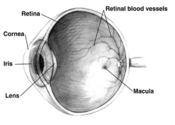The first time that I became aware of the words "macular degeneration" was when my parents were both diagnosed with the disease at approximately the same time. After living in Iowa for more than 65 years, they moved to Sun City, Arizona, where they enjoyed an 18-year retirement in the Del Webb retirement community. Approximately 10 years into retirement, they found out they had macular degeneration (MD) and were already in stage 2 to 3. After being diagnosed, they were very careful to wear sun-glasses and gave up their travels in their Winnebago motor home. By 1993, both were declared legally blind and moved to Dallas to be close to us. The MD progressed each year. Only with very bright light and strong magnification could they read anything.
Although I am not aware if my grandparents had MD, I do remember both of my grandfathers used magnifying glasses to read in their final years, and there have been several cataract surgeries in my extended family.
Five years ago, I was diagnosed at age 60 with the first early signs of macular degeneration. My ophthalmologist at the time gave me no suggestions whatsoever for controlling or reversing the MD process that he had detected. Since he didn't offer any preventive measures, I read everything that I could get my hands on, which is how I learned of Harvard's Age-Related Eye Disease Study (AREDS) and other studies on the relationship between eating large amounts of greens and reducing the risk of MD. I was very impressed and immediately became a "greens" fanatic.
Fortunately, I love to cook very healthy meals, so I invented a collection of recipes that are served once or twice daily at the Roorda house in Dallas. Every day, I have a spinach salad, and if my husband isn't home for lunch, I'll often have another spinach salad at dinner. I love them.
One year later, my new ophthalmologist shared that he saw no signs of MD, I told him about what I was doing at home, and he had read the studies. He told me, "Just keep doing what you are doing." And I have. Each year since, I have been given a clean slate. Today, I have 20/20 vision--not a "crisp" 20/20, but still very good.
My ophthalmologist definitely believes that diet and sunglasses can help reverse MD in the very early stages and stabilize it in later stages. I am a firm believer that when you tell your ophthalmologist that you have a history of macular degeneration in your family, a preventive program ought to be established immediately.
Good Food Sources of Lutein & Zeaxanthin
Brussels sprouts, cooked cooked Spinach, Broccoli, cooked Kale, cooked Spinach, raw Zucchini, raw Peas, cooked 4 Broccoli, raw Corn, cooked Turnip greens, cooked Collard greens, cooked Lettuce, cos or romaine
COPYRIGHT 2004 Saturday Evening Post Society
COPYRIGHT 2004 Gale Group




